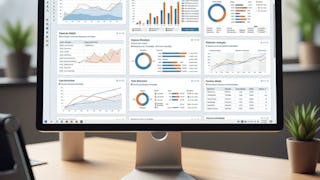![[Featured Image] A data project manager stands before a screen and provides information to her team.](https://images.ctfassets.net/wp1lcwdav1p1/1K8A2CNYiR160HNcBI0v5m/c8282db5ccb60911989a6da647ab8869/GettyImages-1358219358__1_.jpg?w=330&h=216&q=60&fit=fill&f=faces&fm=jpg&fl=progressive)
What Does a Data Project Manager Do?
Explore the role of data project manager and what it takes to lead technical projects focusing on big data. Find out how to leverage project management skills and relevant education to transition into this career.
February 25, 2025
Article

![[Featured Image] A man and woman discuss what they see on a computer monitor while studying for Python certification.](https://images.ctfassets.net/wp1lcwdav1p1/4Z4PVzAWD3FA00WHKoMCoV/9fcb3cd6847c63a32c14cec3e3b2abde/GettyImages-1166861613.jpg?w=330&h=216&q=60&fit=fill&f=faces&fm=jpg&fl=progressive)
![[Featured Image] A man writes in a notebook and looks at his laptop as he takes a data science course online and learns about topics like star schema vs. snowflake schema.](https://images.ctfassets.net/wp1lcwdav1p1/6KDegInO8xcnO1WTWl6e75/0aae248eecc5c618edbb41afbeea49f5/GettyImages-1313356858.jpg?w=330&h=216&q=60&fit=fill&f=faces&fm=jpg&fl=progressive)
![[Featured Image] Two health care data analysts discuss various results from an analysis about how to improve a hospital’s functioning.](https://images.ctfassets.net/wp1lcwdav1p1/vUvVtKDJMwdbsasFdmWYi/f981f2b3f75a3ffb09d0921b29ec7e95/GettyImages-2182330620.jpg?w=330&h=216&q=60&fit=fill&f=faces&fm=jpg&fl=progressive)
![[Featured image] Woman in yellow dual-screen reviewing data analysis](https://images.ctfassets.net/wp1lcwdav1p1/3Z0opa9tMlModMNk65jmuv/ced51a1dda4b0ce95b3d916138cc544f/GettyImages-1338373232__2_.jpg?w=330&h=216&q=60&fit=fill&f=faces&fm=jpg&fl=progressive)
![[Featured image] A team of business data analysts meet and discuss visualizations as they prepare to share their findings with key stakeholders.](https://images.ctfassets.net/wp1lcwdav1p1/1NHIOGo2q5hOkbYqIfgade/0bc24bd561089fedec9088532c00ddfb/Business-professionals-discussing-over-a-graph-1127726411_8477x5651.jpeg?w=330&h=216&q=60&fit=fill&f=faces&fm=jpg&fl=progressive)



![[Featured Image] A cryptanalyst is at a workstation, analyzing data on computer monitors.](https://images.ctfassets.net/wp1lcwdav1p1/7hRHnZsLXCk37EP40omV9u/018cc6afa476f31e7570f8f93d91f21b/GettyImages-1442972530.jpg?w=330&h=216&q=60&fit=fill&f=faces&fm=jpg&fl=progressive)
![[Featured image] A data analyst sits at their laptop smiling at the camera with a group of coworkers in the background.](https://images.ctfassets.net/wp1lcwdav1p1/3ExgLa4vYLV16Sb2IQdGux/c28fdf797ad6009052cd9c2d064ff5a7/Data_analyst_salary.png?w=330&h=216&q=60&fit=fill&f=faces&fm=jpg&fl=progressive)

![[Featured image] A data analytics degree student works on his laptop in a university library.](https://images.ctfassets.net/wp1lcwdav1p1/1XR2cF08DJY1W2zv44848G/d9c1624fae91dbba0a559288a5f5f40b/Data_analytics_degree.png?w=330&h=216&q=60&fit=fill&f=faces&fm=jpg&fl=progressive)
![[Featured image] A data analyst sits on an outdoor patio with their laptop in their lap, working on their portfolio.](https://images.ctfassets.net/wp1lcwdav1p1/6n65wQIVMiBvUJG7u9rVtJ/265c1093d089f528e7f52c238d583fd3/data_analyst_portfolio.png?w=330&h=216&q=60&fit=fill&f=faces&fm=jpg&fl=progressive)
![[Featured image] A business analyst interviews an employee. Both of them have their laptops in front of them.](https://images.ctfassets.net/wp1lcwdav1p1/5vfQELyaDvsspcLpsigHEy/ec1810ecd32ac851a47d952a4f5d1e5d/dat_analyst_vs_business_analyst.png?w=330&h=216&q=60&fit=fill&f=faces&fm=jpg&fl=progressive)
![[Featured image]: Two small business owners are sitting at a table, surrounded by products as they analyze data charts provided by a data analyst.](https://images.ctfassets.net/wp1lcwdav1p1/2rrfhvDFp0diA9IdjsAWZk/d2fd1f1c2bceb87d8c1febc40021d30e/GettyImages-2225071096.jpg?w=330&h=216&q=60&fit=fill&f=faces&fm=jpg&fl=progressive)
![[Featured image] Two men sit in a living room, one working on data analysis on his laptop](https://images.ctfassets.net/wp1lcwdav1p1/2uwvgHERA0c0sPwlruetNc/42b13a63da8973b7d903887fb9a82973/data_analyst_skills.png?w=330&h=216&q=60&fit=fill&f=faces&fm=jpg&fl=progressive)
![[Featured image] A data analyst sits at her desk in front of a laptop computer, looking at the camera.](https://images.ctfassets.net/wp1lcwdav1p1/3CkaYYRYdzir3oglOF6NKR/0dfa4d6e778b1b5508e4577f021b9804/how_to_become_a_data_analyst.png?w=330&h=216&q=60&fit=fill&f=faces&fm=jpg&fl=progressive)
